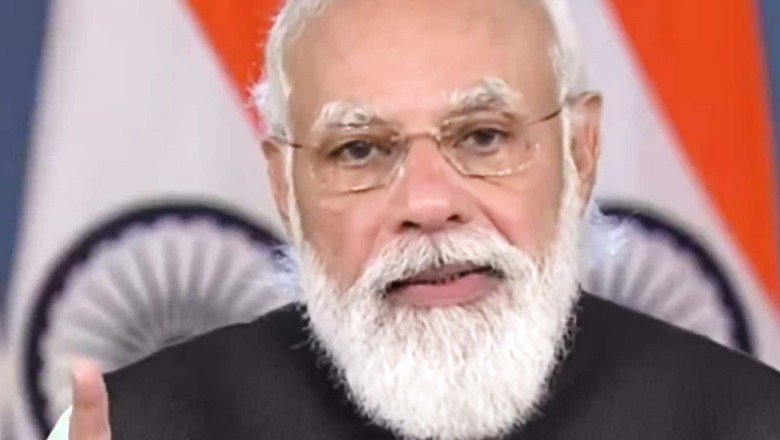
views
Indian politics has experienced a different phenomenon over the last two decades, which has shifted its nucleus. There was a time when it was said that a non-Congress government could never survive its term—and nearly 20 years ago we saw the NDA-1 under Atal Bihari Vajpayee complete its tenure while the BJP under Narendra Modi has won two successive full majority mandates since 2014.
It is therefore evident that Indian politics has witnessed a complete overhaul over the last two decades and Modi happens to be at the centre of this overhaul. If Vajpayee taught the country that a non-Congress government can complete its tenure and deliver solid governance, then Modi has shown that coalition politics is not critical for participatory and inclusive governance.
However, Modi’s politics is not the politics of any quintessential politician, and this is the reason behind his success. Most conventional politicians view electoral contests through the prism of caste, religion, and other arithmetic—and their governance is contingent on these calculations. In contrast, Prime Minister Modi focuses on delivering solid governance to every section of the population rather than cater to specific vote banks.
To cite a few examples, consider the construction of toilets, or Jan-Dhan accounts and even the distribution of LPG cylinders. Each of these policies has played a major role in uplifting the standards of the bottom one-third population—who were unfortunately forgotten by successive governments. This is why only 16 per cent households in rural areas had tapped water in 2019—the corresponding figure in 2021 is well above 40 per cent. Such is the scale of delivery of essential public goods, irrespective of caste, class, or religion, and this has created a new class of citizens who demand more as their aspirations grow.
ALSO READ | Modi Model: 20 Years of Efficient and Effective Governance
The revolution of aspirations is interesting as this is precisely what ensured his success as the chief minister of Gujarat as he frequently mentions that the number one request made to him during his first tenure was to prevent power cuts during dinner in the state. The then chief minister delivered by ensuring 24/7 electricity in the state.
As a matter of fact, a lot of Modi’s policies are also based on his understanding of society, economy and politics in a larger context. An example of this was the issue of gender enrolment gap, which was largely explained by the lack of toilets in schools which discouraged girls to continue with their education.
Similarly, the issue of deteriorating sex rate in key states such as Haryana had also become a major social problem that posed a challenging task of devising an appropriate policy to take corrective action. Modi, however, used his political capital to build a social movement for both, construction of toilets under the Swachh Bharat Abhiyan and the Beti Bachao Beti Padhao scheme. Both came during his early years of Prime Ministership and built on his experience from his CM days. In fact, many had questioned the Selfie with Daughter hashtag and called it a gimmick, but it served as an important signal to society where people were proud to click a picture with their daughters. Even with Swachh Bharat, which emerged as a successful model of participatory governance, the government ensured construction of toilets and greater awareness regarding keeping common areas clean.
Another recent example of Modi’s successful use of his political capital was vaccinations where he encouraged people to get their doses as he encouraged the country to set a world record. India did manage to set a world record and it also managed to break the same on his birthday. We have come a long way from having chief ministers set record with regard to the size of their birthday cakes to setting vaccination records on the birthday of our Prime Minister.
The ability to deliver public goods to the bottom one-third population gives Narendra Modi the political capital necessary to undertake strong reforms that the country needs. This is one of the reasons why most reforms, including the issue of privatization or labour reforms, have been welcomed by most except for those with political interests. This is precisely why his politics is beyond caste and religion as it is based on delivering the essential to the most vulnerable while using his political capital to undertake necessary reforms to transform the Indian economy.
He has successfully created a constituency of those who were left out during India’s growth take-off years and designed programmes that can ensure inclusive development across the country. It was this motivation to reduce regional development imbalances that subsequently led to the aspirational districts programme whereby the government delivers the essential services to the poorest regions of the country. It is evident that Modi is committed towards achieving a bare minimum standard of living for all—one that far supersedes the standard of living for close to 33-66 per cent of India’s population in 2014.
Modi’s 20 years of career in politics, despite a bitter campaign against him that in many ways continues to date, shows his effectiveness in delivering on his promises and that is what sets him apart from the rest. An objective study of these 20 years will show the great Modi reset in Indian politics whereby development and governance have become the focal point of discussion rather than caste or religion. Perhaps, many chief ministers will do well to study his experience and recognize the importance of performance rather than stick to their old mantra of Indian politics.
Sumeet Bhasin is Director at the Public Policy Research Center in New Delhi. The views expressed in this article are those of the author and do not represent the stand of this publication.
Read all the Latest News , Breaking News and IPL 2022 Live Updates here.




















Comments
0 comment